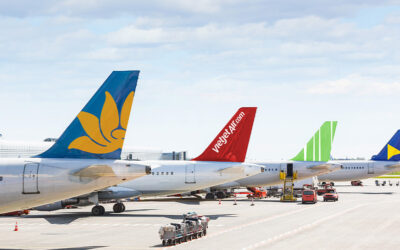Aircraft, fuel and crew are the three key cost drivers of successful airline operations. Finding the most efficient route and staffing it with properly qualified personnel is a critical financial consideration. So, for the effective utilisation of entire fleet and crews, good planning is a matter of key importance.
However, mistakes happen. One of the recent examples of crew planning problems can be a case of Ryanair, the low-cost carrier based in Dublin. The airline reported that poor planning and a bit of bad luck left the company with a shortage of working pilots, many of whom took time off, for the autumn. Consequently, the shortfall has forced Ryanair to cancel 2,100 flights starting on September 16th and continuing through October. So, even the most insignificant mistake made while planning and scheduling crew resources can turn into serious problems bringing huge financial losses for airlines. Have you ever thought what reasons lie behind all the challenges in crew planning and scheduling?
Major reasons behind troublesome planning process
One of the main factors making crew scheduling and planning such a difficult process is frequent changes in airlines’ market situations. Particularly this makes it challenging to maintain efficient operations that can lead to underutilised fleet and crew, or even worse, a shortage of resources.
The representative of Small Planet Airlines, a rapidly growing independent leisure airline company operating across several continents, revealed that they face the biggest challenges when there is a lack of crew. It becomes difficult to plan all the flights within Flight Time Limitations (FTL) requirements, plan SBYS, develop the so-called ‘plan B’ in case of sickness, etc. Correspondingly, the departments dealing with crew planning usually have to make many changes in crew rosters.
Not surprisingly, the first draft of plans for a given planning period can be updated several times until the final plans are fixed and published. In the operational phase these plans may still be altered. For example, flights may be cancelled or delayed and crew may report sick. Therefore, airlines tackle these problems by having some buffer resources (for example stand-by crew).
“The main reasons behind corrections made while planning are: changes in the flight schedule (new flights, changed schedules), sick leaves, employee resignation”, comments J. Pugaciauskiene, Head of Planning Division at Small Planet Airlines. Due to large numbers of crew employed by airlines, even small changes in productivity can have a significant impact on an airline’s profits: a single percent improvement can translate into several million euros.
How is the crew planning and scheduling process managed?
In order to manage the process smoothly and eliminate all the possible risks of failure, airlines have a challenging task: to create a ‘realistic’ route programme for each (IATA) season that makes optimum use of the available resources.
In general, crew management process at airline companies can be considered as a separate form of art. It is constantly influenced by a dozen of predictable and unpredictable events: a lack of crew members, changing weather conditions, political unrest, etc. So, how is this process carried out at the airlines? Planning and scheduling process of crews is usually divided into several planning stages. For this reason flight, duty and rest time of crews at airlines are managed by different departments simultaneously working on their part of resource planning. These departments communicate in order to adjust their plans and to update each other with changes.
For example, Small Planet Airlines manages its crews with the help of two departments. The responsibility for long-term planning (monthly rosters) is taken by a Planning department, whilst Crew Dispatch is in charge of short-term changes (72 hours from the present moment).
Therefore, to achieve efficient operations, airlines gather huge teams that are invisible to an ordinary passenger. Every single department, especially these conducting tasks related to crew planning and scheduling, is of a vital importance. Good planning and scheduling are among the main aspects making an airline’s operations successful.








